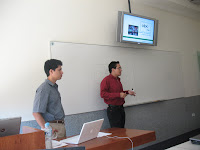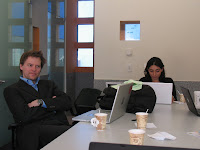franchising the charles river?
Today the major German newspaper wrote an interesting article about public policy schools in Germany. You might want to read it (even if it is in German). We did pretty good. Also check out what the blogosphere has to say about it…
no comment, Philipp
Web 2.0 and Government
yesterday at the Government 2.0 workshop in the ESPP Alexander Schellong and I discussed the impact of web 2.0 on government. Web 2.0 is a tag used to talk about technologies and practices that allow the aggregation of user-generated content into meaningful (or actionable) information by making data sharable across platforms. We used a simple framework distinguishing between the political process and public administration to describe government and then asked where in the model would web 2.0 applications make a difference. We found some interesting examples from insight communities in the intelligence field, youtube-questions to presidential candidates, to facebook revolutionaries in Pakistan. And the future is still to come.
The interesting aspect of Web 2.0 is that it is not a value-neutral technology that can be applied to more efficienctly structure processes, but a way-of-life that shapes and changes power-relationships. And this needs to be analyzed. tbc.
playing around with the eepc
if you cannot decide if you want to participate in the OLPC give-one-get-one campaign or just buy an eeepc, check out the html-based demo. It is a amazing to play with and allows you to see if you would be willing to go for the 7-inch model.
Mind The Gap: Copyrights, Copynorms, and the Panopticon
John Theranian’s article Infringement Nation: Copyright Reform and the Law/Norm Gap is required reading. As a potentially infringing teaser…
In the late afternoon, John takes his daily swim at the university pool. Before he jumps into the water, he discards his T-shirt, revealing a Captain Caveman tattoo on his right shoulder. Not only did he violate Hanna-Barbera’s copyright when he got the tattoo—after all, it is an unauthorized reproduction of a copyrighted work—he has now engaged in a unauthorized public display of the animated character.38 More ominously, the Copyright Act allows for the “impounding†and “destruction or other reasonable disposition†of any infringing work. Sporting the tattoo, John has become the infringing work. At best, therefore, he will have to undergo court-mandated laser tattoo removal. At worst, he faces imminent “destruction.â€
Martin Luther and Critical Perspectives on Global Public Policy
Joerg Friedrichs and other scholars have been using the term “new medievalism” to offer an alternative framework to think the global in today’s world. He analyzes in his article, the meaning of new medievalism (EJIR 2001)
(..) the apparent contradictions between globalization, fragmentation and sovereign statehood (…). Neither conventional International Relations theory nor the discourse about globalization seem able to account for these contradictions. As a conceptual alternative, the notion of `new medievalism’ is introduced. For the present purpose, medievalism is defined as a system of overlapping authority and multiple loyalty, held together by a duality of competing universalistic claims. Thus, the Middle Ages were characterized by a highly fragmented and decentralized network of sociopolitical relationships, held together by the competing universalistic claims of the Empire and the Church. In an analogous way, the post-international world is characterized by a complicated web of societal identities, held together by the antagonistic organizational claims of the nation-state system and the transnational market economy. New medievalism provides a conceptual synthesis which hopefully transcends some of the current deadlocks of IR theory and, at the same time, goes beyond the fundamental limitations of the globalization discourse.
As persons interested in global public policy making, we then need to ask what radical strategi(e)s(ts) were successful in medieval public policy making, in order to develop and reflect ways of creating public value in the contemporary world. The first that comes to mind is Martin Luther, probably the most succesful policy maker ever. Martin Luther was born in 1483 and studied at the University of Erfurt where he was mainly influenced by the writing of Aristotle and Willam Occam from 1501 to 1505.
He entered a closed Augustinian friary in Erfurt on July 17, 1505. In 1507, he was ordained to the priesthood, and in 1508 began teaching theology at the University of Wittenberg. On October 19, 1512, he was awarded his Doctor of Theology and, on October 21, 1512, was received into the senate of the theological faculty of the University of Wittenberg, having been called to the position of Doctor in Bible.
On October 31, 1517, Luther wrote to Albert, Archbishop of Mainz and Magdeburg, protesting the sale of indulgences. He enclosed in his letter a copy of his “Disputation of Martin Luther on the Power and Efficacy of Indulgences,” which came to be known as The 95 Theses.
The 95 Theses, their distribution by the emerging practice of print-capitalism, and Martin Luther’s writing and politics, transformed the medieval world.
The story gives us a lot of homework if we want to understand and shape policy making in today’s newly medieval world.
Law and Public Policy in the German-Speaking World
To understand law-driven public policy making in German-speaking European countries, one has to reflect the traditions in legal thinking. Kristoffel Grechenig and Martin Gelter (University of St. Gallen and Vienna University) are doing this in The Transatlantic Divergence in Legal Thought: American Law and Economics vs. German Doctrinalism:
Economic analysis plays a major role in the American legal discourse, while its position in the German-speaking legal debate remains comparatively limited. In Germany and Austria, a widespread aversion against law and economics can be observed among legal scholars. This article advances an explanation for this divergence on the basis of two main factors: First, American legal realism enjoyed great success, whereas the German free-law movement failed to leave a lasting impression. While legal realism transformed American legal thought and opened up the discourse to policy arguments, the predominant German legal theory emphasizes the internal coherence of the legal system, and assigns only a limited role to external elements. Second, the different philosophical roots and attitude towards and utilitarianism and consequentionalist thinking in general can explain why law and economics takes a prominent position in the US legal academia. We argue that a convergence of the discourses over the medium term is unlikely.
Think about what this means for public policy in ASG (Austria, Switzerland, Germany).
Can we please get rid of advertising and start the conversation?
Advertising is an atavism of modernity that is financing the expansion of network society.
Do we need Folksonomies in Mature Organizations?
Folksonomies work when a critical number of participants are willing to invest time into improving the framework of their work environment, without any direct payoff. Folksonomies can be generated as the an unintended consequence of individual action or as the intended acts of socially minded participants.
Ronald Coase would have tried to take a shot at the question on the level of abstraction it was posed on: Markets tag products and services with prices as an unintended byproduct of supply meeting demand (folksonomy), while firms classify inputs strategically (taxonomy). So, he would argue no folksonomies inside the firm. However, with the introduction of cost centers, internal markets, flattened hierarchies, and the networked enterprise, the question becomes more complicated. It is has two aspects, namely:
a. How do we work? – do we play our role in a given hierarchy or do we work as problem-solvers.
b. Why do we work? – do we work because of incentives or do we identify with the problem-solving.
Depending on the combination of “how” and “why” the work environment will be conducive for folksonomies. So we have the following combinations:
(1) We play a role and are incentivized to work, example: any McJob [folksonomies will not play a big rolel].
(2) We play a role and identify with the problem-solving, example: medical personnel, police, etc. [folksonomies could work].
(3) We are problem-solvers and work for incentives, example: finance, techdirt-community [folksonomies might work if a mid-term monetary incentive is given].
(4) We are problem-solvers and identify with problem-solving, example: open source developers, some creative jobs [folksonomies will fly].
So the question cannot be answered on the level of abstraction it was posed, however, it can help us to distinguish between the contexts in which it makes sense to introduce folksonomies as a tool.
Global Public Policy Making II (OLPC MX)

Theoretically, in network society we expect public policy to be made by policy entrepreneurs that identify and define challenges, create coalitions of the willing and are responsible towards the outcomes they generated.
A group of EGAP students that were introduced to a challenge this summer took it up and are trying to change the world.
a. they are creating content for the OLPC project.
b. they acquired funding from the Curriki-foundation.
c. they hope to institutionalize the project in the university.
d. they are trying to impact global primary education policy by connecting the Mexican enciclomedia project with OLPC.
Peer Producing Global Public Policy I (The Manifesto)

Remember the Wikipedia (peer-produced) definition of peer production:
Commons-based peer production is a term coined by Harvard‘s Law professor Yochai Benkler to describe a new model of economic production in which the creative energy of large numbers of people is coordinated (usually with the aid of the internet) into large, meaningful projects, mostly without traditional hierarchical organization or financial compensation. He compares this to firm production (where a centralized decision process decides what has to be done and by whom) and market-based production (when tagging different prices to different jobs serves as an attractor to anyone interested in doing the job).
The term was first introduced in Benkler’s seminal paper Coase’s Penguin.[1]
This is how we are working on the manifesto. Get involved!!! Either by coming by the workshop room on the first floor on EGAP or on the wiki.
 Author of machiavelli.net, proud father of three, interested in shaping network society. Welcome to my blog.
Author of machiavelli.net, proud father of three, interested in shaping network society. Welcome to my blog.
